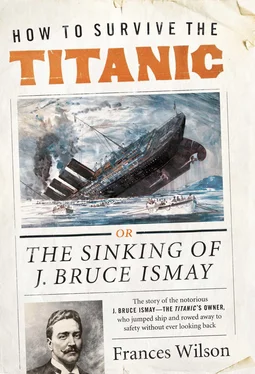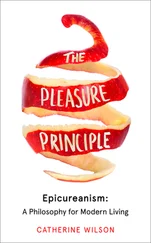Ismay then returns to the perennial subject of whether the two of them will ever meet again. ‘Of course we will,’ he says, ‘why do you get such ideas in your head? Writing is a very poor substitute but surely it is better than nothing so don’t make this an excuse for not writing. You will surely be coming to this side ere long and we will meet.’ He knows he will never again go to America. He ends in his usual fashion, apologising for ‘such a long letter’ and telling her she is ‘constantly in [his] thoughts’. In a postscript he adds that ‘it is always difficult to say what one would like at the end of a letter but I’m sure you will understand’. Mrs Thayer understands everything.
To and fro the letters go, each one trying to replicate the intensity of their first contact. Ismay repeatedly describes himself as ‘talking’ to Marian Thayer but it is remarkable how little he says beyond expressing his desire to talk to her further. What, apart from his sense of blamelessness, does he want to talk about? Does he want this to be an amorous exchange, or one in which they simply comfort one another as fellow beings? Are his reasons for writing the same as her own? Whatever it is he is trying to say, his words simply freeze in the air before melting. He expresses his trauma as a confined banality and his letters, like his responses to the two inquiries, wander around and around the same immovable fact. He plays along with Marian Thayer’s peculiar fads in which he clearly has no real interest, he takes on board her specific vocabulary as though he has no words of his own, and he hands back nothing but the continued drip of his sense of unfairness. When Ismay next writes it is mid-December, he has turned fifty and the shooting season, which has taken ‘my thoughts from other things’, is nearly over. Apart from his daughter Margaret, ‘who has left her husband to keep me company’, he is alone in the house. Florence and the children are currently in London, but will be returning to Liverpool for Christmas when they are expecting a ‘large party — all family, sisters, brothers, son-in-law’. Ismay is dreading it. ‘I am not fond of the so-called festive season, full of pleasure for the young and full of sorrow and unhappy memories for the old like myself.’ Forgetting that he has already, in a previous letter, confided in her about his retirement plans, he now confides again, ‘in the strictest confidence’, that he is ‘going out of business on 30 June’ and that this decision has nothing to do with ‘that terrible calamity’. He will be sorry to no longer be involved with the White Star Line as he ‘loves the business and all connected with it’ but he has ‘neglected other matters’. The reason for his early retirement, he reveals, is to ‘see more of my family and to try and make them happy’, adding that ‘it will be a very great wrench. I will leave Liverpool and settle somewhere in the country.’ But can this really be the reason? Ismay’s children, aged twenty-three, seventeen, fifteen and ten, are now drifting in their own directions and his marriage has been over for years. Ismay, whose motivations always have a secret side, has been divesting himself of his chattels since the day his father died.
He is more anxious about the future than he is about the past; as usual he is looking straight ahead. He is moving into a life of being rather than doing and his anxieties about retirement are nothing new; before he boarded the Titanic he had expressed to Harold Sanderson his ‘very mixed and doubtful feelings’ about the coming years. He delayed the date of his retirement from the presidency of the IMM and the chairmanship of the White Star Line from January to June 1913 because he thought it would be easier in the summer months to deal with the ‘little or nothing’ he now had ‘to fill up my time’. He now has cold feet again about giving up the White Star Line, a company for whom he feels a ‘sentimental attachment’, and announces that he has changed his mind about retirement, that while he is willing to let the IMM presidency go to Sanderson, he still wants to be at the helm of his father’s firm. J. P. Morgan replies this will not be possible; that Ismay has, ‘by your ability and your strong personality overshadowed the other managers’ and that it would be ‘easier for these men, as also for the incoming president, to assert their independence if their former chief is not on the boards with them’. Ismay does not understand what Morgan is saying to him; that he is considered a liability, that he represents the errors of the past, that he is seen as an autocrat around whom no one can breathe. 11He does not mention in his letters to Mrs Thayer that he has been excised from his own company.
Marian Thayer’s most recent letter to Ismay had contained a selection of photographs of herself and Jack, and Ismay has chosen to keep two of the mother and one of the son — ‘I hope you will not consider that I am too grasping.’ ‘Do you know,’ he continues, looking at her picture as he writes, ‘not a single day goes by without my thinking of you. I cannot understand it.’ He wonders how she is and wishes he could talk to her: ‘How I should love it.’ He then, as though it were the most natural thing in the world, says something extraordinary: ‘I often think of where our friendship would have taken us if that awful disaster had not taken place, how well I remember our conversations when everything looked so bright. You had a very peculiar attraction to me and I loved talking to you and hearing you talk, you interested me so much… How I ramble on. I must stop.’ Had the Titanic not gone and hit the iceberg, he and Mrs Thayer could have been happy together: this is what occupies Ismay’s mind. ‘My God,’ as Jim says to Marlow when he jumps from the Patna, ‘what a chance missed, what a chance missed.’
In a newspaper article written on the twentieth anniversary of the wreck, Jack Thayer recalled that when he was standing on the deck with his parents, Ismay approached them and told them that the ship had one hour to live. Ismay, who did not even warn his own valet, of course wanted Marian Thayer to live and of course wanted to live himself, especially now that there was someone worth living for.
In October, six months after the disaster, a collection of three sea stories by Joseph Conrad appeared in the shops. Titled Twixt Land and Sea, his new book marked a turning point in Conrad’s career. No longer under the shadow of Henry James, Conrad was once more the master of ‘adventure and psychology’, he was flying his ‘old colours of mystery, romance and the strangeness of life’. 12It was the second story in the volume, called ‘The Secret Sharer’, but variously titled in draft ‘The Secret Self’, ‘The Second Self’, ‘The Other Self’ and ‘The Secret-Sharer’, which was his favourite. It appeared, perfect and complete, in two weeks; Conrad experienced none of the usual agonies and interruptions in the writing process. Some part of him had been released by the tale; it made him feel curiously elated. ‘“The Secret Sharer”, between you and me, is it. Eh?’ he wrote to Edward Garnett. ‘No damn tricks with girls, there, eh? Every word fits and there’s not a single uncertain note. Luck, my boy. Pure luck!’
‘The Secret Sharer’ is told by a fledgling captain who remains unnamed. He has been in command of his ship — also unnamed — for under two weeks and is still waiting to see whether he ‘should turn out faithful to that ideal conception of one’s own personality every man sets up for himself secretly’. He is soon to find out: keeping watch in his sleep suit one night, rejoicing ‘in the great security of the sea as compared with the unrest of the land’, he finds in ‘the sleeping water’ a naked man hanging onto the rope ladder.
Читать дальше












